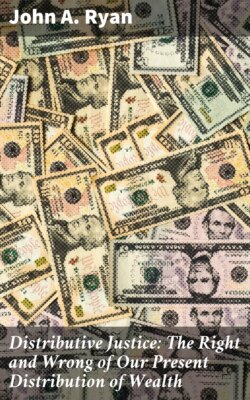Читать книгу Distributive Justice: The Right and Wrong of Our Present Distribution of Wealth - John A. Ryan - Страница 31
На сайте Литреса книга снята с продажи.
The Teaching of Pope Leo XIII
ОглавлениеTable of Contents
The official teaching of the Church on the subject is found in the Encyclical, "On the Condition of Labour," by Pope Leo XIII. In this document we are told that the proposals of the Socialists are "manifestly against justice"; that the right of private property in land is "granted to man by nature"; that it is derived "from nature not from man, and the State has the right to control its use in the interest of the public good alone, but by no means to abolish it altogether." These statements the Pope deduces from a consideration of man's needs. Private property in land is necessary to satisfy the wants, present and future, of the individual and his family. Were the State to attempt the task of making this provision, it would exceed its proper sphere, and produce manifold domestic and social confusion.
While Pope Leo defines the natural right of private ownership as incompatible with complete Socialism, that is, collective use as well as collective ownership, his statements cannot fairly or certainly be interpreted as condemning the Single Tax system, or any other arrangement which would leave to the individual managerial use and secure possession of his holding, together with the power to transmit and transfer it, and full ownership of improvements. These are the only elements of ownership which the Holy Father defends, and which he insists upon as necessary. The one element of private ownership which the Single Tax system would exclude; namely, the power to take rent from and profit by the changes in land values, finds no place among the advantages of private ownership enumerated in the Encyclical.
There is, indeed, one passage of the Encyclical in which Pope Leo seems to allude to the Single Tax, or to some similar proposal. He expresses his amazement at those persons who "assert that it is right for private persons to have the use of the soil and its various fruits, but that it is unjust for any one to possess outright either the land on which he has built, or the estate which he has brought under cultivation. But those who deny these rights do not perceive that they are defrauding man of what his own labour has produced. For the soil which is tilled and cultivated with toil and skill utterly changes its conditions: it was wild before, now it is fruitful; was barren, but now brings forth in abundance. That which has thus altered and improved the land becomes so truly a part of itself as to be in great measure indistinguishable and inseparable from it. Is it just that the fruit of a man's own labour should be possessed and enjoyed by any one else? As effects follow their cause, so is it just and right that the results of labour should belong to those who have bestowed their labour."
In this passage we find two principal statements: first, that those persons are in error who declare full private ownership of land to be unjust; and, second, that it is wrong to deprive a man of the improvements which he makes in the soil. Now the first of these propositions does not touch the Single Tax system as such; it only condemns the assertion of Henry George that private ownership is essentially unjust. It is directed against one of the arguments for the system, not against the system itself. More specifically, it is a refutation of an argument against private land ownership, rather than a positive attack upon any other system. It could be accepted by any Single Taxer who does not agree with Henry George that the present system is essentially unjust. The second proposition does not apply to the Single Tax system at all; for the latter would concede to the individual holder the full ownership and benefit of improvements; and it could easily be so administered as to protect him against injury in any case in which improvement values were not exactly and clearly distinguishable from land values.
While Henry George opposed the doctrines of the Encyclical in his "Open Letter to Pope Leo XIII," all his arguments are directed against the proposition that private ownership is right and just. The "Letter" is an attack upon private ownership rather than a defence of the Single Tax. Apparently its author did not find that Pope Leo condemned any positive or essential element of the Single Tax as a proposed system of land tenure.
If the rejoinder be made that Pope Leo could have had no other group of persons in mind than the Single Taxers, when he wrote the paragraph quoted above, our answer must be that he did not definitely identify them, either by naming them, as he named the Socialists, or by any other sufficiently explicit designation. Applying to this paragraph the customary and recognised rules of interpretation, we are obliged to conclude that it does not contain an explicit condemnation of the Single Tax system.
To put the substance of this chapter in two sentences: Private landownership is a natural right because in present conditions the institution is necessary for individual and social welfare. The right is certainly valid as against complete Socialism, and probably valid as against any such radical modification of the present system as that contemplated by the thoroughgoing Single Taxers.
